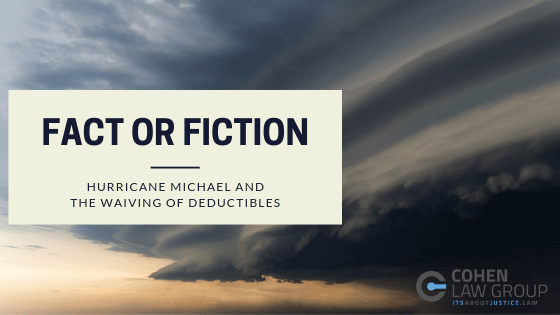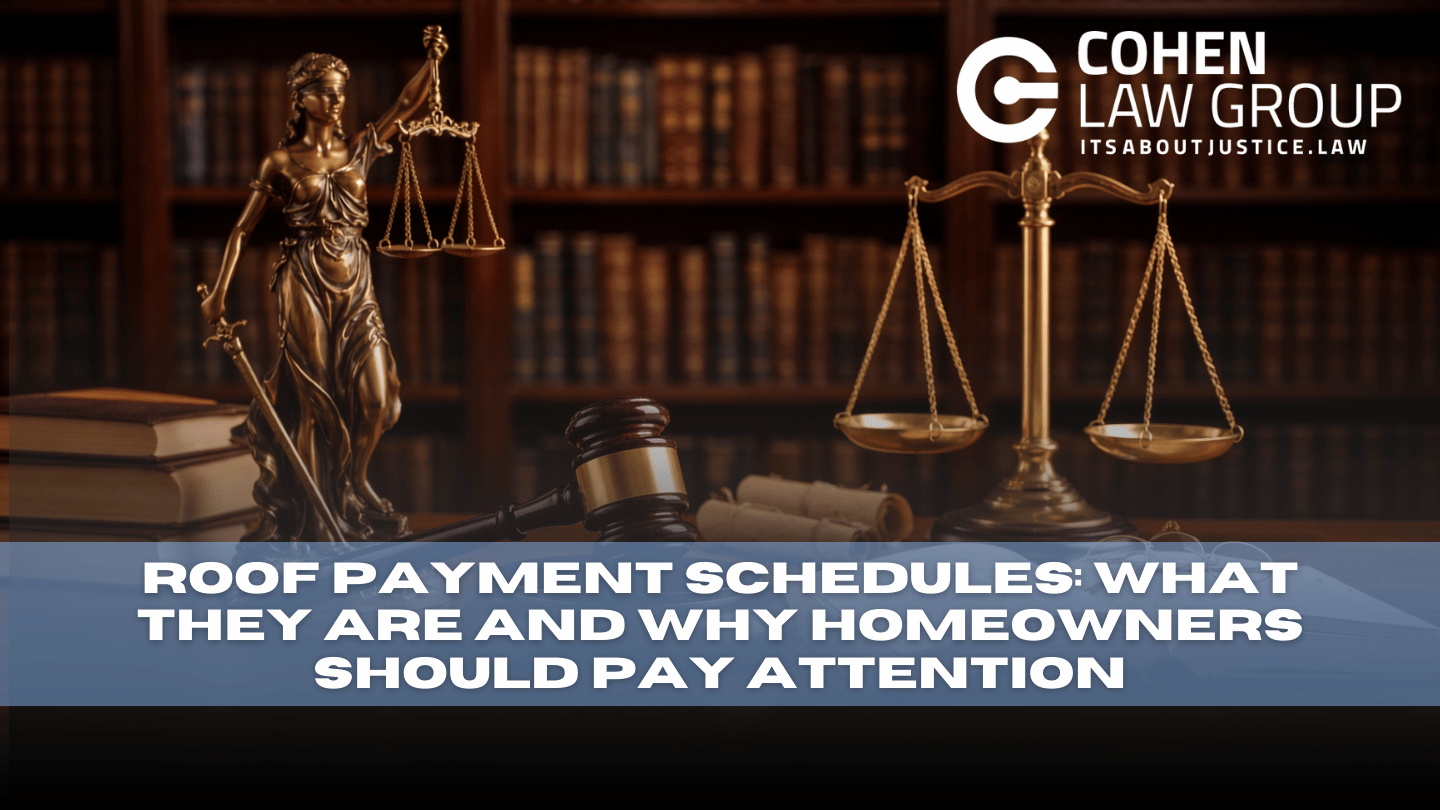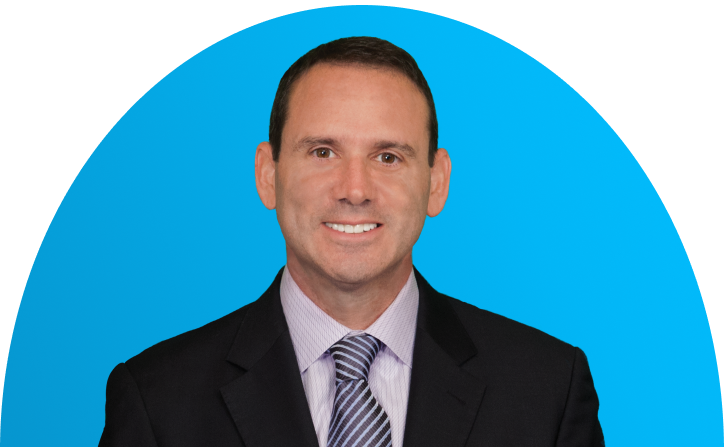Fact or Fiction – Hurricane Michael and The Waiving of Deductibles
Hurricane Michael was one of the most powerful storms to ever make landfall on the continental United States. Hurricane Michael was the third-most intense Atlantic hurricane to make landfall in the contiguous United States in terms of pressure and was the fourth-strongest landfalling hurricane in the contiguous United States, in terms of wind speed.
Hurricane Michael reached Category 5 status with peak winds of 160 mph just before making landfall near Mexico Beach, Florida, on October 10, becoming the first to do so in the region as a Category 5 hurricane, and as the strongest storm of the season.
Does A Category 5 Hurricane Allow For Waiving A Hurricane Deductible?
The idea that a Category 5 Hurricane allows for the waiving of a hurricane deductible is complete fiction.
Here at the Cohen Law Group, we have been assisting victims of Hurricane Michael since immediately after the storm. As of April 19, 2019, the National Oceanic and Atmospheric Administration conducted a detailed post-storm analysis on all the data available for Hurricane Michael and officially marked Hurricane Michael a Category 5 storm on the Saffir-Simpson Hurricane Wind Scale.
Soon after Hurricane Michael was updated to a Category 5, the rumor mill in the panhandle areas began about the waiving of the Hurricane deductible. It is possible that due to the extensive amount of damage caused by Hurricane Michael, insureds in the panhandle area saw insurance companies absorb the deductible when the damage to the property exceeded the policy limits or in the event of a total loss of the insured property.
This article is intended to help insured homeowners better understand the facts about hurricane deductibles and how, in certain circumstances, a deductible can be adsorbed rather than waived.
What Is A Deductible?
Florida is a unique state in that we are a peninsula, surrounded by water on three (3) sides and in the middle of hurricane alley. Due to our position on the continent and our susceptibility of being struck by a hurricane, Florida has specific and unique hurricane deductibles.
Florida law and insurance policies are very specific regarding when, for what time frame, and how many hurricane deductibles are applied within a calendar year. A deductible is an amount of money that you yourself are responsible for paying toward an insured loss. When a disaster strikes your home or you have a car accident, the amount of the deductible is subtracted, or “deducted”, from your claim payment.
For example, if you have a $10,000 loss to your home and you have a $2,500 deductible, your insurance company would pay you $7,500.
A “hurricane loss” comes with specific deductibles which typically result in the insured having higher out of pocket expenses. The deductibles for hurricane losses is the percentage of the loss paid by the insured before the insurance company begins to pay any amount towards the damages to the insured property.
Commonly, hurricane deductibles range from two (2), five (5) or ten (10) percent of the total amount of the Coverage A of the policy. This deductible, or out of pocket expense, is commonly much larger than a “All Other Perils” deductible”. Each type of property insurance policy form (HO-3, HO-6 etc.), has its own available deductible options; however, most typical homeowner’s insurance policies provide for deductible options at $500, 2%, 3%, 4%, 5% or 10%, $1,000, $2,500 or $5,000 deductible, depending on the actual value of your home.
The larger your deductible, the lower your hurricane premium. However, if you select a higher deductible, your out- of-pocket expenses in the event of a hurricane claim will be higher. For example, the median home value in Florida is approximately $235,000 dollars. If you were to choose a 2% hurricane deductible, your deductible would be $4,700 while if you choose a 10% deducible, you would save some money on your hurricane premium, but your deductible would be $23,500. This level of deductible can be quite challenging to contend with after a loss.
Usually, if you do not choose an “All Other Perils” or “Hurricane” deductible at renewal, your previously selected deductibles will apply. It is important to go over your deductible options with your insurance agent when renewing your policy. Your applicable deductible amounts can be found on your declaration page, which is typically the first pages of your insurance policy.
When Does A Hurricane Apply To A Loss To The Property?
Florida policies have specific definition of what a “hurricane” actually is. Policies define a hurricane as a storm system that has been declared to be a hurricane by the National Hurricane Center of the National Weather Service.
Policies also define what a hurricane occurrence is. Typically, a policy provides that a “Hurricane occurrence” means any loss resulting from the peril of windstorm caused by a “hurricane” during any period:
a. Beginning when a hurricane watch or hurricane warning is issued for any portion of Florida by the National Hurricane Center of the National Weather Service;
b. Remaining in effect for as long as “hurricane” conditions exist anywhere in the state of Florida; and
c. Ending 72 hours after any hurricane watch or hurricane warning has been discontinued for all counties of the state of Florida by the National Hurricane Center of the National Weather Service
What Is A Calendar Year Hurricane Deductible?
As explained above, a hurricane deductible applies to any windstorm claims pursuant to the above. Hurricane deductibles are applied on a calendar year basis.
Typically, a policy provides as follows:
Calendar Year Hurricane Deductible Described
A hurricane deductible issued by us or another insurer in our insurer group.
1. Can be exhausted only once during each calendar year; and
2. Applies to loss to Covered Property caused by one or more hurricanes during each calendar year.
The dollar amount of the calendar year hurricane deductible is shown on your Declarations.
A minimum deductible of $500 applies.
Essentially, you are insured by the same insurance company and if a second windstorm hurricane loss occurs from a second hurricane during the same calendar year, the deductible applied will be the greater of the remaining portion of the hurricane deductible left from the first hurricane deductible or the “All Other Perils”
For example, if you had a $10,000 hurricane deductible, and a first hurricane loss occurred causing $25,000 in damage, your insurance company would pay you $15,000. Should a second hurricane loss occur in the same calendar year, your deductible for the second hurricane loss would be the amount of your “All Other Perils” deductible.
How Is A Deductible “Absorbed”?
In the event of a total loss or in the event that a loss caused damage which exceeds the policy limit under the policy, the insurance company should apply the deductible to the overage in the coverage amount, thus, effectively absorbing the deductible.
For example, if your home is insured for $100,000 and your deductible is 2% (for hurricane losses), your deductible would be $2,000. If the damages to the insured property are a direct result of the hurricane loss and the damages exceed $122,000, pursuant to Florida Statute 627.702 Florida Statutes, the insurance company should apply the deductible to the $2,000 and the insured should be paid the policy limit of $100,000, thus, effectively absorbing the deductible amount.
Due to the extensive damage in the panhandle area, it is likely there are many total loss claims, thus fueling the rumor of the waiver of hurricane deductibles.
Make sure the insurance company is properly indemnifying you for your Hurricane Loss. Call us today to learn your rights and let our team assist you with your claim. When you call today, you will speak with an attorney who can explain your rights!
COHEN LAW GROUP
References:
https://www.nhc.noaa.gov/data/tcr/AL142018_Michael.pdf
https://www.noaa.gov/media-release/hurricane-michael-upgraded-to-category-5-at-time-of-us-landfall
877 So. 2d 774 (Fla. 4th DCA 2004)
943 So. 2d 823(Fla. 1st DCA 2006)
General Star Indem. v. W. Fla. Vill. Inn, 874 So. 2d 26, 2004 Fla. App. LEXIS 6090
https://www.iii.org/article/understanding-your-insurance-deductibles
Property Loss Adjusting 2.16-.19, 3.46-.47 (Donna J. Popow ed., 3d ed. Am. Inst. for Chartered Prop. Cas. Underwriters/Ins. Inst. of Am. 2003); Property Loss Adjusting 106-12 (James J. Markham ed., 2d ed. Ins. Inst. of Am. 1995).
DISCLAIMER: This website is for informational purposes only and does not provide legal advice. Please do not act or refrain from acting based on anything you read on this site. Using this site or communicating with Cohen Law Group through this site does not form an attorney/client relationship. This site is legal advertising. Please review the full disclaimer for more information by clicking here.








